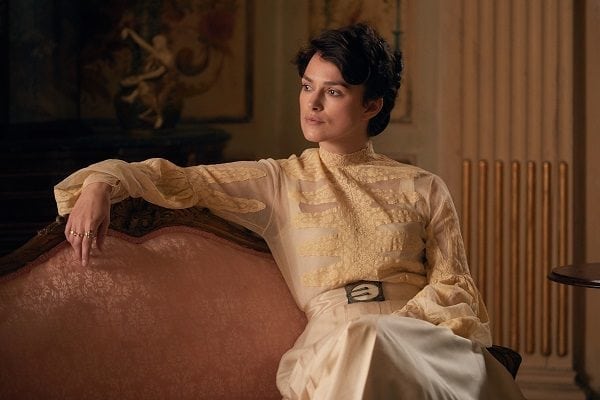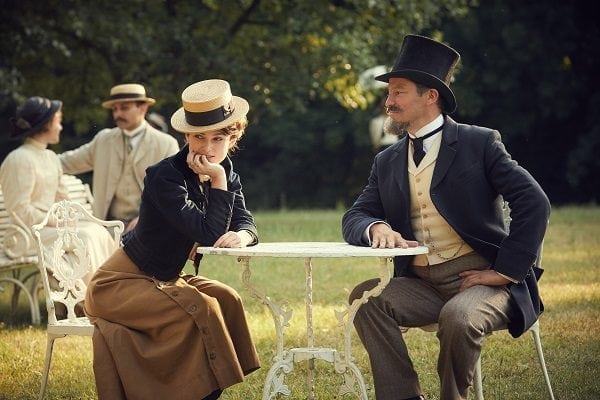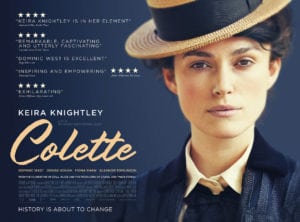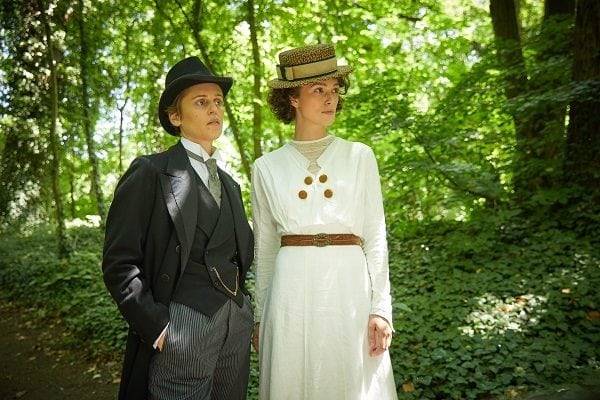Colette, 2018.
Directed by Wash Westmoreland.
Starring Keira Knightley, Dominic West, Fiona Shaw, Denise Gough, Sloan Thompson, Arabella Weir and Robert Pugh.
SYNOPSIS:
Colette is pushed by her husband to write novels under his name. Upon their success, she fights to make her talents known, challenging gender norms.

Tales of smart, passionate women wrestling their agency away from gross men will never not be popular cinematic subject matter, and the collective appetite for such narratives rings doubly true in a post-#MeToo world.
This is a fact ably capitalised upon by Wash Westmoreland’s (Still Alice) Colette. For while the formative years of the titular Nobel Prize-nominated French author may have transpired well over a century ago, the relevance of her struggle to be heard by a slyly contemptuous patriarchy of course remains distressingly relevant in 2019.
The story begins as Sidonie-Gabrielle Colette’s (Keira Knightley) husband Henry Gauthier-Villars (Dominic West) operates a literary “factory” in which he hires numerous ghostwriters to churn out articles and novels under the pen-name “Willy.”
With financial straits encroaching upon him, however, Henry also encourages Colette to contribute content, with her “Claudine” series quickly becoming a runaway success. Colette’s lack of authorial credit inevitably becomes a bugbear, though, which combined with Henry’s philandering and self-effacing ways, threatens to ruin their marriage.
Colette may look like a fairly typical, stately period drama, yet thanks to a tone that’s surprisingly breezy and light on its feet, even frothy, it manages to balance some welcome soapiness with the unavoidably grim tenor of the era.
To be clear, Westmoreland’s film isn’t a miserable cri de coeur for put-upon women everywhere, but a sure celebration of one woman’s triumph, and one that even dares to be fun for a good deal of its runtime. Especially compelling is its impressively nuanced examination of Colette’s marriage, which laudably refuses to make her hubby into a walking cartoon character.
The urge must’ve been there, especially with Henry’s constant self-satisfied priggishness, yet a brilliant Dominic West is still able to find the desperate, sad humanity in a man all-too-keen to insist that infidelity and fierce self-interest are just something that’s in male DNA.
The marital discord has the consequence of leading its stars down a surprisingly kinky path, as Colette and Henry experiement – often hilariously – with separately seeking other bed-mates. Westmoreland’s fairly staid approach to sexuality lacks the red-blooded verve that might make the most of the set-up, but it’s nevertheless franker than meticulous period films tend to be.

The unmistakable reason to see this film, though, is Keira Knightley, who gives one of the most effervescent and charming performances of her career as an initially passive woman driven to great things by her simple desire to be taken seriously in a time where female artists positively weren’t. Her chemistry with West is palpable and leads to several tenacious confrontations, all acted with intense conviction by the pair.
And don’t Knightley and West look good doing it all? Westmoreland’s film is a visual feast throughout thanks to exacting lensing from BAFTA-nominated cinematographer Giles Nuttgens (Hell or High Water), to say nothing of the expectedly robust costume work and terrifically ornate production design. The glue holding it all together, though, might be Thomas Adès’s punchy musical score, which avoids genre cliches while amping up the tingly sense of excitement.
Far from the stuffy, awards-baiting drama you might be expecting, Colette delivers a rousing account of legendary feminist emancipation through a decidedly peppier lens than many filmmakers would’ve dared attempt. Keira Knightley does sublime justice to her real-life subject in this lithe, topical ode to female empowerment.
Flickering Myth Rating – Film: ★ ★ ★ / Movie: ★ ★ ★ ★
Shaun Munro – Follow me on Twitter for more film rambling.













